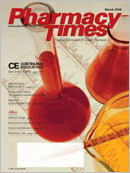Publication
Article
Pharmacy Times
Reliant Pharmaceuticals' Omacor (omega-3-acid ethyl esters)
Author(s):
Coronary artery disease (CAD) is themost common type of heart disease,afflicting approximately 13 million peoplein the United States.1,2 Common risk factorsinclude age, family history of heartdisease, hypertension, obesity, diabetes,smoking, physical inactivity, and hypercholesterolemia.3 Specific lipid abnormalities,such as hypertriglyceridemia,also have been associated with CAD.
Although several options exist fortreating lipid disorders, a pharmaceuticalpreparation of omega-3 polyunsaturatedfatty acids (PUFAs) was approved by theFDA in November 2004.
Omacor, manufactured by ReliantPharmaceuticals, is indicated to managehypertriglyceridemia as an adjunct todiet. It also may be used as adjuvanttherapy for secondary prevention inpost-myocardial infarction (MI) patients.4
Pharmacology
Omacor is a lipid-regulating agentknown as omega-3-acid ethyl esters. Theethyl esters are a combination of eicosapentaenoicacid (EPA) and docosahexaenoicacid (DHA). The mechanism ofaction is not clearly delineated, although areduction in hepatic synthesis of triglyceridesmay be due to EPA and DHAbecause they are poor substrates for theenzymes responsible for triglyceride synthesis.4,5
Clinical Studies
A 1-year, double-blind, randomizedtrial examined the safety, tolerability, andeffectiveness of omega-3 PUFAs in loweringtriglycerides in patients with establishedcoronary heart disease and persistinghypertriglyceridemia (serumtriglycerides >2.3 mmol/L). Fifty-ninepatients were enrolled and receivedeither Omacor 2 g twice daily or placebo,in combination with simvastatin 10 to 40mg daily. Serum triglycerides were significantlydecreased by 20% to 30%, andvery low-density lipoprotein cholesterolwas reduced by 30% to 40%, in patientstaking omega-3 PUFAs at 3, 6, and 12months, compared with either baselineor placebo (P < .005). Overall, Omacorwas well-tolerated by the participants.6
The GISSI-Prevenzione trial observedthe effects of omega-3 PUFAs and vitaminE on morbidity and mortality in post-MI patients. The multicenter, open-labelstudy enrolled approximately 11,400patients with recent MIs (<3 months) toreceive either 1 g of omega-3 PUFAs, 300mg of vitamin E, either alone or in combination,versus standard care. The primarycombined end point included the rate ofall-cause death, the rate of cardiovasculardeath, nonfatal MI, and nonfatalstroke. The results demonstrated thattreatment with omega-3 PUFAs only,through 4-way analysis, significantly loweredthe risk of the primary end point,with a relative risk decrease of 15% (P =.023). In the combined-treatment group,cardiovascular death, nonfatal MI, andnonfatal stroke showed a relativedecrease in risk of 20% (P = .008).7
Safety
The most common adverse eventsassociated with Omacor include dyspepsia,flu-like symptoms, and taste distortion.4,5 Omacor may prolong bleedingtime in patients taking anticoagulants,antiplatelets, salicylates, and nonsteroidalanti-inflammatory agents. Betablockers,estrogens, and thiazide diurecticsmay decrease the therapeuticeffect of Omacor.4,5
Outlook
Omacor is available in 1-g gelatinsoft capsules, with each gram containingroughly 900 mg of omega-3 ethylesters—465 mg of EPA and 375 mg ofDHA.4 The recommended daily dose forOmacor in the treatment of hypertriglyceridemiais 4 g per day as 1 singledose or in 2 divided doses.8 The 1-g,once-daily dose is recommended forthe management of post-MI patients.8Omacor appears to be a safe, effective,and tolerable option for loweringtriglycerides and mortality rate in post-MI patients.
Dr. Soo is a senior research pharmacistwith the Investigational DrugService at Brigham and Women'sHospital, Boston, Mass. Ms. Hoach isa sixth-year PharmD candidate fromNortheastern University, currently onclinical clerkship in the InvestigationalDrug Service at Brigham andWomen's Hospital.
For a list of references, send astamped, self-addressed envelope to:References Department, Attn. A. Stahl,Pharmacy Times, 241 Forsgate Drive,Jamesburg, NJ 08831; or send an e-mailrequest to: [email protected].

Newsletter
Stay informed on drug updates, treatment guidelines, and pharmacy practice trends—subscribe to Pharmacy Times for weekly clinical insights.






